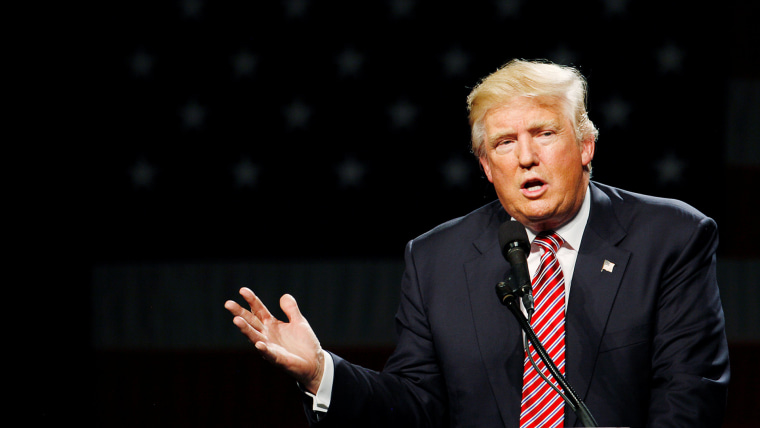Trump raised just over $3 million in May -- the month he secured enough delegates to win the Republican nomination -- while Clinton raked in more than $26 million, according to the latest filings from the Federal Election Commission. Those numbers -- weak for a Congressional campaign, let alone a run at the White House -- have put Trump and the Republican Party at an extraordinary financial disadvantage heading into the general election.
I can appreciate why some of these figures and fundraising terms can make eyes glaze over, but it's important to understand just what a disaster this is for the presumptive Republican nominee. As June got underway, Trump had just $1.29 million in the bank (or "cash on hand"). That's a joke. When Rachel noted this on the show last night, she had to check to make sure the decimal point wasn't in the wrong place.
To put that in context, at the same point four years ago, Mitt Romney had $17 million in the bank. Hillary Clinton started June with $42 million.
Heck, Ben Carson -- remember him? -- ended May with $1.7 million cash on hand, and he ended his campaign in early March.
On Twitter in late May, Trump
wrote, "Good news is that my campaign has perhaps more cash than any campaign in the history of politics- b/c I stand 100% behind everything we do."
Three weeks later, it's the sort of comment that's become a cringe-worthy punch-line.
Similarly, Trump
boasted on NBC's "Today" this morning, "I understand money better than anybody." If that's true, then the Republican candidate should understand just how big a problem he has. (In the same interview, Trump suggested "the party" is to blame for his campaign's financial troubles, which doesn't make a lot of sense.)
And speaking of "the party," the Republican National Committee -- the entity Trump expects to pick up the slack given that he has no real operation of his own --
raised $11 million in May, including $3 million through the Trump Victory fund, a joint fundraising committee created late last month. The RNC began June with $20 million cash on hand.
These are not good numbers for Republicans. Four years ago, in May 2012, the RNC
raised more than $34 million and ended the month with more than $60 million in the bank.
Wait, it gets worse. NBC News'
report added that much of the money the Trump campaign managed to collect "went back into Trump corporate products and services."
[The Associated Press] reported that a review of Federal Election Commission filings shows $6.2 million -- or about 10 percent of total campaign expenditures -- had been disbursed to the candidate's corporate products and services through the end of May. The campaign has paid $423,000 to Trump's private Mar-a-Lago Club in south Florida for rent and catering and an additional $135,000 in rent and utilities to Trump Restaurants LLC. Even $4.7 million spent on campaign swag has a tie to Trump: The provider, Ace Specialties, is owned by a board member of son Eric Trump's charitable foundation.
Not surprisingly, details like these are raising questions anew from Trump critics who've argued his entire campaign venture is some kind of scam.
So what are we left with? Donald J. Trump
has no real campaign. He has no platform. He has no meaningful understanding of public policy or current events. He has a tiny and inadequate staff. He has a noticeable lack of support from his party, parts of which are plotting a convention coup against him.
Trump could, in theory, write himself a massive check and start building a meaningful campaign operation, but (a) he may not have nearly as much money as he pretends to have; (b) there's literally no evidence that he's prepared to invest heavily in a losing enterprise.
As we
discussed a few weeks ago, Trump has all kinds of problems as a presidential candidate -- he's unpopular, he's unqualified, he knows practically nothing about government -- but at least the New York Republican is familiar with wealth. If there's one aspect of this presidential campaign that should be relatively easy for the presumptive GOP nominee, it should be his finances.
And yet, money is proving to be one of Trump's biggest pitfalls.
